
As Switzerland leaves Haiti, Swiss NGOs fight to stay on
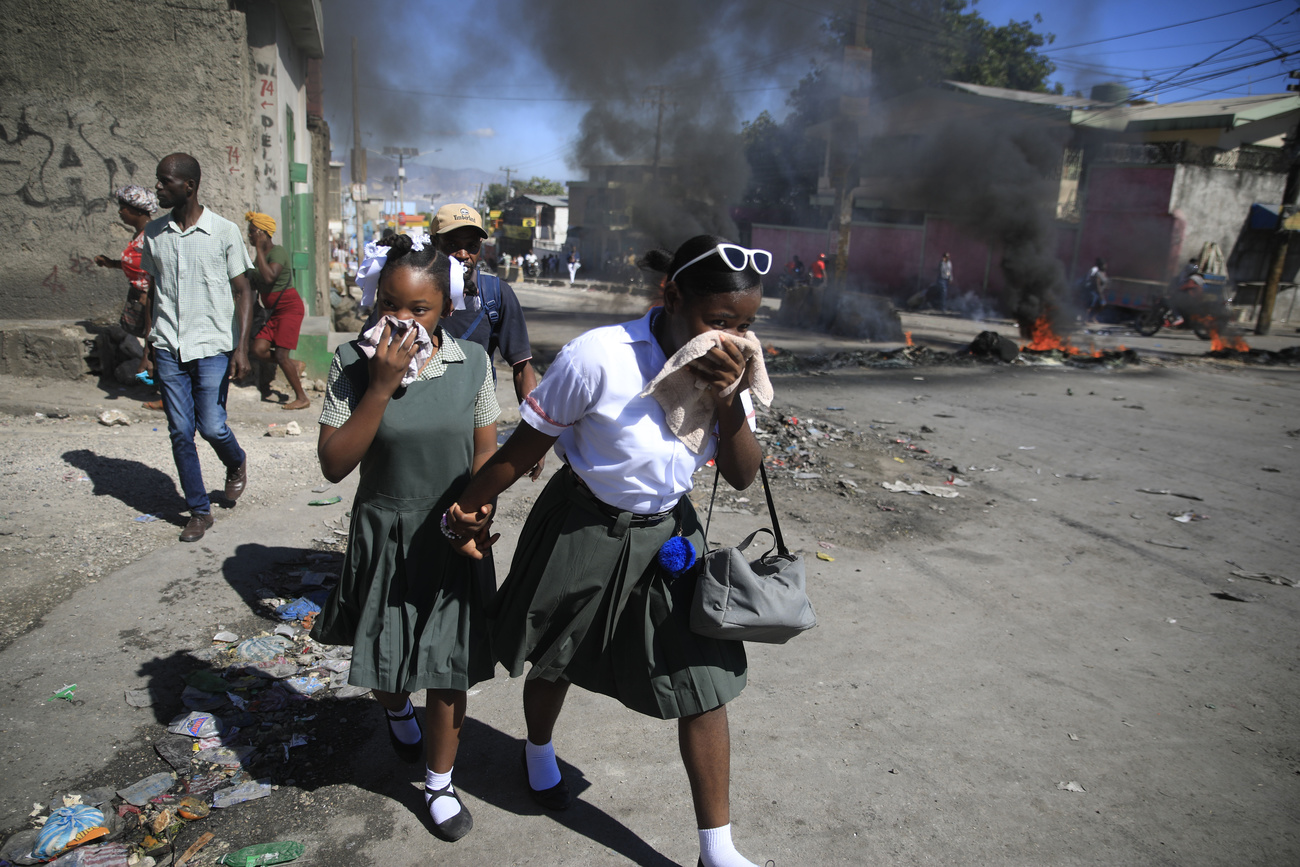
Switzerland is pulling the plug on bilateral development aid in Haiti. But this isn’t stopping Swiss NGOs from continuing their work as the Caribbean island heads for collapse.
The start of the current school year in Haiti was unlike any other the country has experienced in recent memory. After several weeks of delay due to gang violence, schools finally opened their doors in October, only to become the target of looting by armed groups. Such was the case for one high school in Pétion-Ville, a suburb of the capital Port-au-Prince.
“The children were under siege,” recalls Guerty Aimé, Haiti coordinator for Swiss NGO Terre des Hommes. She says classes could only be held sporadically but parents continued to send their children despite the risks. The choices are simple: “Either you go to school or you join a gang,” says Aimé, as criminal groups actively recruit minors.
With gangs seizing controlExternal link of over half of the capital and encroaching on other parts of the island, armed violence against schools has risen ninefoldExternal link in the past year, the United Nations reports. Entire neighbourhoods live in fear. Murders and kidnappings are on the rise. The outbreak of cholera last October, coupled with widespread social unrest fuelled by discontent with the government, has only made matters worse. “People are negotiating survival on a daily basis,” says Aimé.
Amid this precarious situation, the country’s sixth-largest state donor, Switzerland, is pressing ahead with plans to pull out of Haiti following a 2020 decision to end all bilateral development assistance in Latin America and the Caribbean. It is even accelerating its withdrawal from Haiti due to security risks on the ground: funding will be terminated at the end of 2023, one year earlier than expected.
‘Past gains in poverty reduction undone’ in Haiti
“This implies an important reduction of Switzerland’s financial resources made available for Haiti’s development,” says Elisa Raggi, a spokesperson for the Swiss foreign ministry.
In 2020 the government had suggested that focusing on fewer regions – sub-Saharan Africa, Asia, North Africa and the Middle East, and Eastern Europe – would be a more efficient use of development aid. But critics, including the UN Special Rapporteur on the Right to Development, raised concernsExternal link that Switzerland was basing its funding decisions on its long-term interests rather than on the goal of reducing poverty.
Dozens of bilateral projects in Haiti are at stake, in areas such as agricultural productivity, economic reforms and good governance, which Switzerland is funding to the tune of CHF10 million ($10.2 million) in 2023.
Switzerland has been Haiti’s sixth-largest state donor, behind the United States, Canada, France, Spain and European Union institutions. In 2021 France decided to increase its development aid to reach 0.55% of its GDP and refocus that aid on its former colony Haiti, among other countries.
In all Haiti receives around CHF1 billion in foreign aid per year, but the results have been mixed, according to the Swiss development agency.
The situation in Haiti has been fragile since the 2010 earthquake that devastated much of the country but has worsened since President Jovenel Moïse was assassinated in July 2021. Armed groups are estimated to number about 200 and engage in various criminal activities, including intimidation, extortion, drug trafficking and money laundering.
Sources: SDC, Foreign Policy
From 2024, its bilateral engagement will switch from development to humanitarian assistance, to meet immediate needs such as food and water and improve disaster response. The embassy in Port-au-Prince has already been replaced by a humanitarian aid office. But this assistance will not match its development budget: humanitarian funds for 2024 will be CHF5.9 million, or the equivalent of just over half the 2023 development budget.
The Swiss withdrawal comes as the Haitian economy hits dire straits, having shrunk for three years in a row. Aid groups warn that Haiti, the poorest country in the Western hemisphere, is on the verge of collapse. The current crisis means that “past gains in poverty reduction have been undone”, says the World BankExternal link. Even the Swiss Agency for Development and Cooperation (SDC) acknowledgedExternal link in a report that any effects of international development assistance, which represents about 10% of Haiti’s GDP, “are difficult to see”.
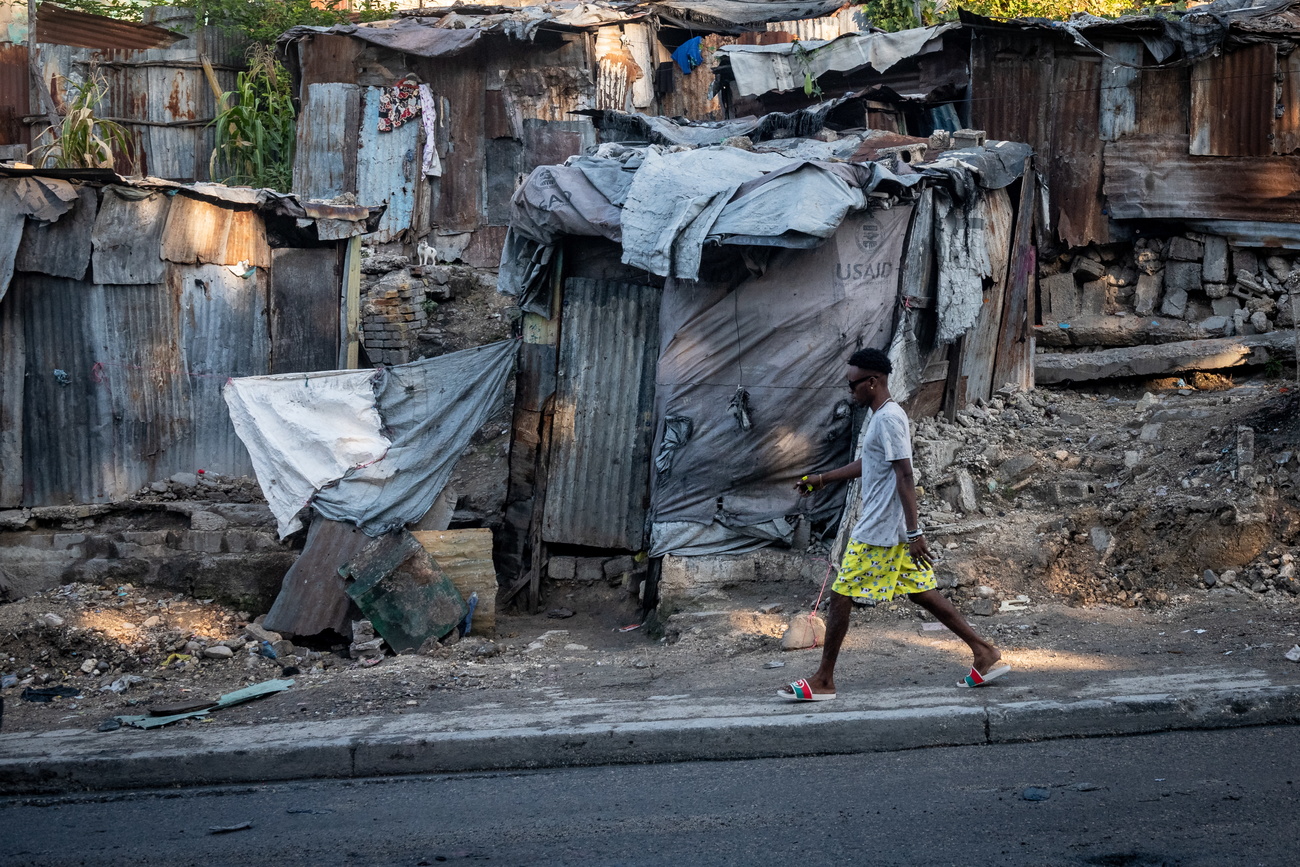
But Switzerland insists it is not abandoning the Haitian people. The SDC has said it is committed to a gradual, “responsible” exit. It will continue to fund Haiti’s development through multilateral channels, according to Raggi, although she would not disclose an amount. Switzerland will also carry on as board member of the Inter-American Development Bank, the main source of multilateral funding for the region’s most vulnerable countries, says Raggi.
Building long-term capacity to recover from economic collapse
For Caritas Switzerland, which is managing several Swiss-funded projects in Haiti, Switzerland’s change in focus is not necessarily misplaced, given the multiple crises facing Haitians.
“Maintaining a humanitarian presence is absolutely critical and welcome,” says Conor Walsh, Haiti country director for the NGO. But Caritas, which does both humanitarian and development work, believes one should lead to the other. “The humanitarian work should always have a longer-term perspective in building a community’s capacity to recover, rebuild and ultimately regain its economic and social wellbeing,” says Walsh.
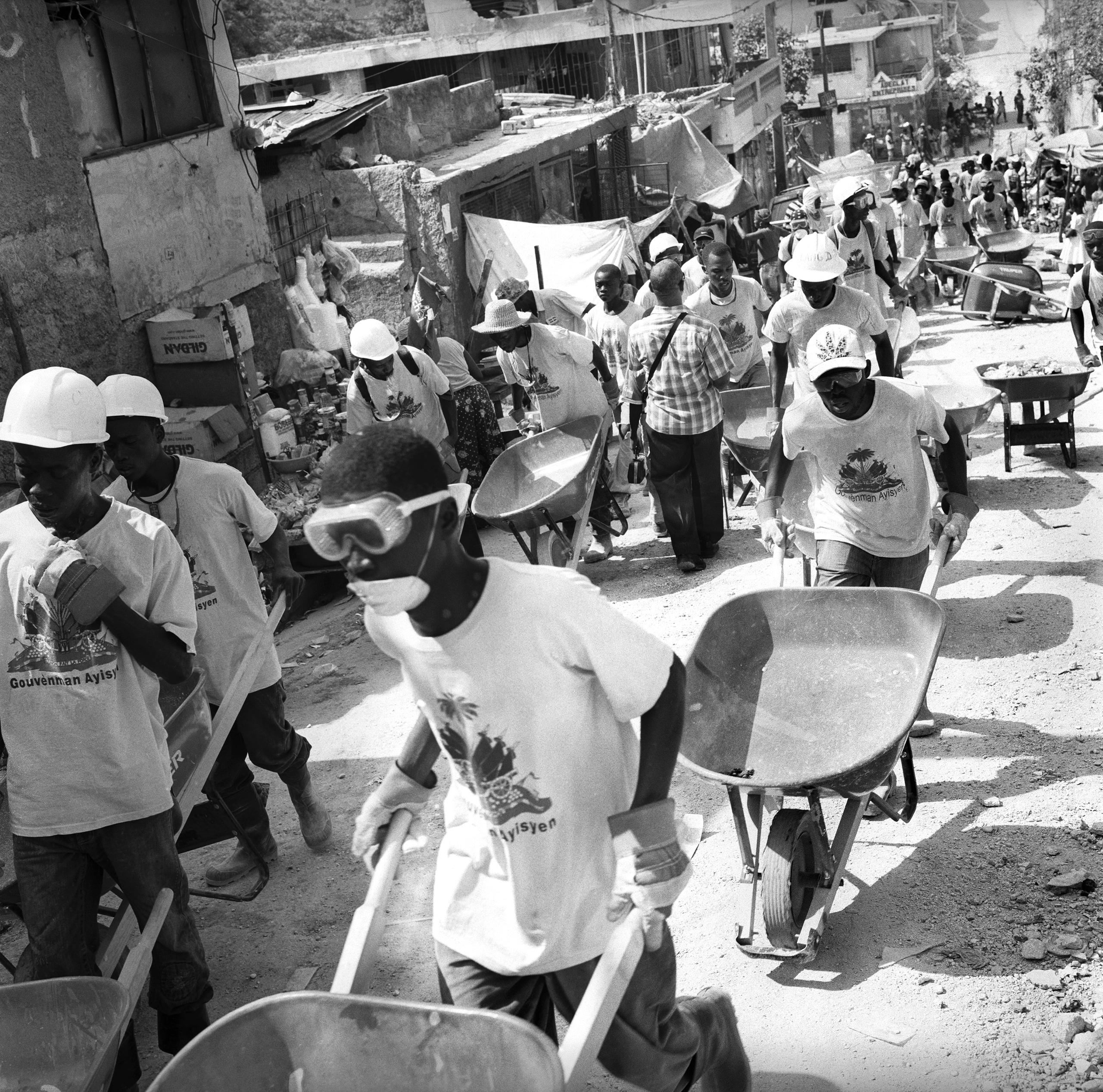
More
Haiti: The perpetual liberation
One of the projects Caritas is leading offers vocational training and strengthening quality standards mainly in the construction industry. With Swiss funding coming to an end, the organisation redesigned the programme to finish this year after little more than four years, instead of continuing for two more phases as originally planned.
The non-profit group is now looking for new donors to finance these next phases, plus another project, which helps farmers in the country’s northwest to increase agricultural productivity and produce more sustainable crops. The SDC has offered to support the NGO in its search, by facilitating access to potential funding sources, just as Raggi says it is doing for other projects it has financed until now.
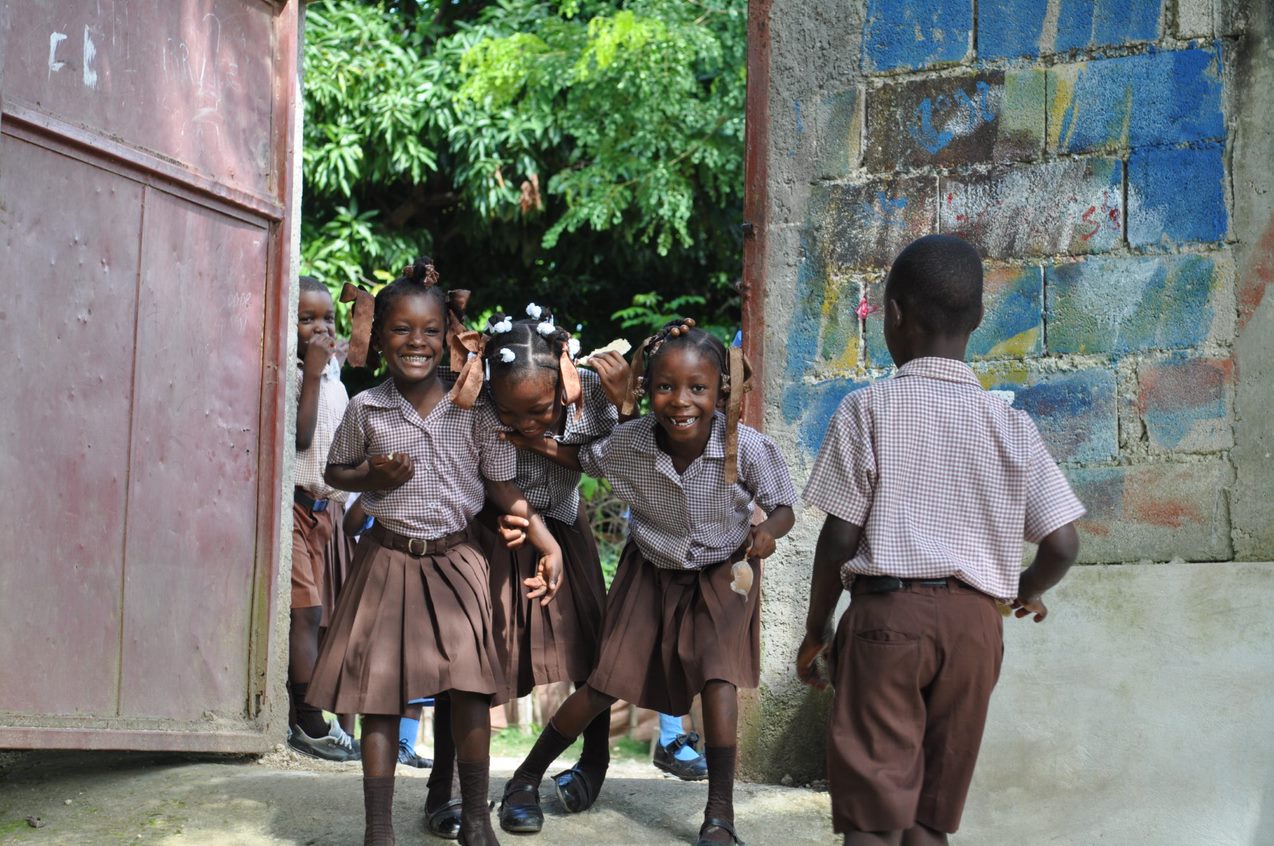
For Terre des Hommes, which promotes access to education in Haiti, the end of Swiss engagement will have no impact on day-to-day operations since it receives funding from Bern for its entire package of programmes around the world, rather than for individual projects or countries, says its secretary-general, Christophe Roduit.
Haiti a difficult operating environment
But although the NGO’s funds are unaffected by the Swiss withdrawal, Terre des Hommes still has financial worries in Haiti. With 40% inflationExternal link and fuel shortages exacerbating supply chain disruptions, prices of everyday goods have exploded – to the point that even school meals have become expensive to provide, says Aimé of Terre des Hommes.
“So although we still get [financial] support for our programmes, let’s just say the needs have changed and multiplied,” she explains.
The NGO, however, is persevering through these challenges. It now relies more heavily on its local partners to keep open most of the 17 schools it helps operate. The priority is to keep children safe on the way to school and once they’re there.
Caritas too is determined to stay, even though its work has been affected not only by the Swiss withdrawal but also by ongoing violence. Walsh is now managing operations from neighbouring Dominican Republic. The organisation’s 35-strong local staff go to the office in Port-au-Prince only when security conditions allow and otherwise work from home – when internet and electricity are available. Local Caritas partners, on the other hand, were hit during persistent looting last September.
“They had everything – absolutely everything – stolen from their offices and had to restart,” says Walsh.
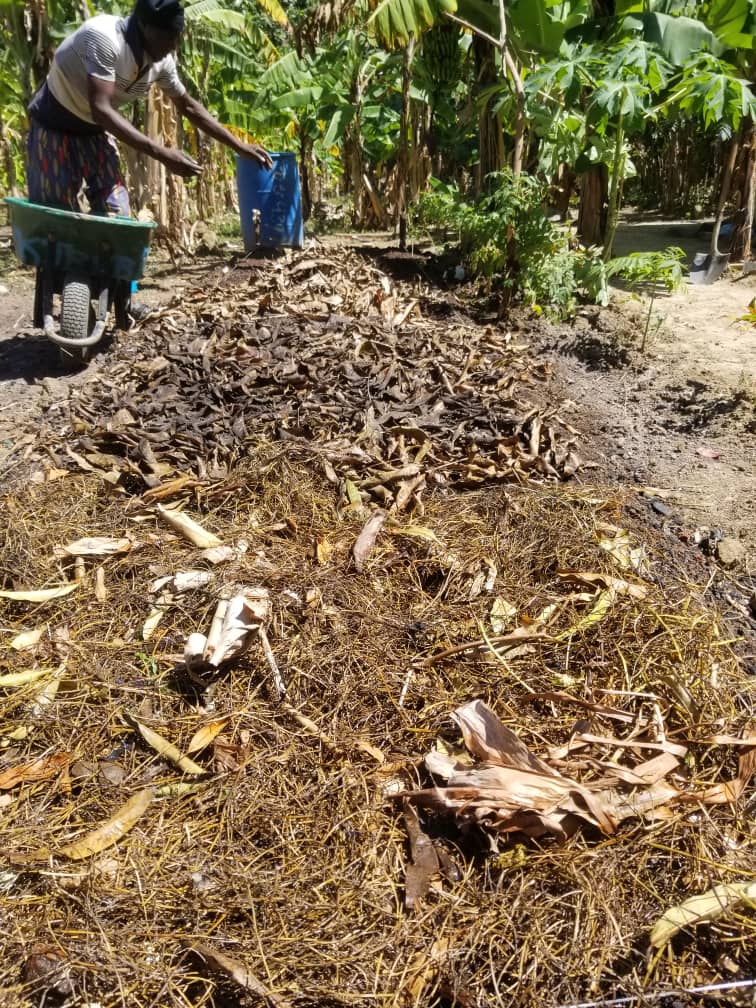
Despite these difficulties, the group’s project in the northwest has seen roads being built and farmers continuing to produce crops – mainly, says Walsh, thanks to the resilience of farmers and local staff. But it’s also running behind schedule. The team were forced to drop parts of the project because of difficulties getting materials on time, says Walsh. Travel outside the capital is now possible only by air because of social unrest and armed checkpoints set up by gangs.
Haiti is too vulnerable on its own
Given all these obstacles and growing needs, the UN and its partners have doubled their funding appeal for Haiti compared to 2022 to $715 million, and are calling on the international community to not abandon the island.
“We cannot see the light at the end of the tunnel – of this crisis – and that can provoke a certain [donor] fatigue and slow down generosity,” says Roduit. “That’s totally understandable. But it’s precisely because we are perhaps in the darkest part of this tunnel that we need to act.”
While many of the country’s problems are difficult to solve, Walsh says one thing is clear: “Haiti is simply too vulnerable to be left on its own.”
Edited by Virginie Mangin

In compliance with the JTI standards
More: SWI swissinfo.ch certified by the Journalism Trust Initiative



























You can find an overview of ongoing debates with our journalists here . Please join us!
If you want to start a conversation about a topic raised in this article or want to report factual errors, email us at english@swissinfo.ch.